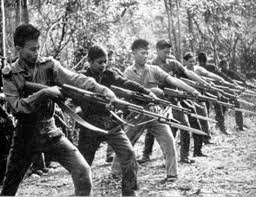
The US labor movement is on the ropes. Membership is way down and they are having huge problems gaining public support.
As leading SEIU activist Stephen Lerner told a March 19, 2011, Building Solidarity through Community Power: Community-Labor Coalitions panel at New York’s Left Forum
Unions are almost dead we cannot survive doing what we do but the simple fact of the matter is community organizations are almost dead also
They don’t dare let you know that though.
Two leading labor unionists, AFL-CIO President Richard Trumka and Communications Workers President Larry Cohen, both with ties to Democratic Socialists of America, are throwing down the gauntlet against the “Tea Party” and Middle America.
From the Communist Party USA‘s Peoples World
Organized labor mobilized in congressional districts nationwide in August, with two top leaders saying union activists this year will take the place of the tea party radicals of 2009-10. And the unionists, leaders and organizers say, are mad.
In separate telephone conferences, AFL-CIO President Richard Trumka and Communications Workers President Larry Cohen laid out the ambitious agenda. They said unionists demand lawmakers stop paying attention to Wall Street and resume paying attention to Main Street – and specifically to measures to create jobs…
Cohen declared the mobilization not only would tackle current demands, such as preserving Social Security and Medicare and fighting for job creation, but that it carries an implied political message: Politicians who do not support workers and their causes will not get labor’s endorsements or money in elections this fall and next year.
As evidence, he cited the New Jersey AFL-CIO convention, which voted on endorsements in this fall’s state legislative races. To get statewide endorsements, candidates needed votes from delegates representing 67 percent of the state’s unionists.
New Jersey Democrats who supported GOP Gov. Chris Christie’s law cutting state workers’ pension benefits and increasing their contributions – including one unionist who is state Assembly speaker – flunked. Many got majorities; none got two-thirds.
“People are ready to be at town halls and meetings in August, confronting them,” Cohen said of politicians who either actively oppose workers or who sit on their hands. “This will not be like two years ago” where the tea party dominated the debate, he said…
“We spent the last couple of months dealing with a politically manufactured debt ceiling crisis, not the jobs crisis,” Trumka said, referring to the debt-deficit deal and the brinkmanship, pushed by the tea party radicals, that led to the deal.
“Working people will fight back, with allies, to say ‘Enough is enough,'” he added.
The federation organized dozens of events in cities nationwide to demand politicians tend to the jobs problem, at a time of 9.1 percent unemployment and unemployment and underemployment that ranges from one-sixth to one-fourth of the workforce. It also plans to send workers and activists to lawmakers’ town hall meetings to demand action on a broad-based jobs agenda.
Those activists will take the place of the tea party radicals of two years ago, whose sometimes violent demonstrations scared supporters of health care revision – and whose energy was then co-opted by corporate interests for their own ends, notably smashing workers and the middle class.
Labor’s socialist leaders understand that 2012 is ‘do or die’ for them.
Though in a far weaker state than they let on, they aim to throw every resource they have in to the battle to both intimidate their opposition and move public opinion their way.
In 1968, the embattled Vietcong threw everything they had at the American forces in a suicidal bid to influence US public opinion – the famous “Tet offensive.”
While slaughtered on the battlefield, the Vietcong, aided by much of the US media, scored a major propaganda victory that turned US public opinion heavily against the war.
Many commentators would acknowledge that America lost the Vietnam War largely because of the “Tet” propaganda victory.
In military terms, the United States was the victor of the Tet Offensive for the Communists did not succeed in maintaining control over any part of South Vietnam. The Communist forces also suffered very heavy losses (an estimated 45,000 killed). However, the Tet Offensive showed another side of the war to Americans, one which they did not like. The coordination, strength, and surprise instigated by the Communists led the U.S. to realize that their foe was much stronger than they had expected.
Faced with an unhappy American public and depressing news from his military leaders, President Lyndon B. Johnson decided to end the escalation of U.S. involvement in Vietnam.
The unions are now about to mount an American “Tet Offensive.”
This time America should call their enemy’s bluff.
Don’t be fooled again, like you were in ’68.







Speak Your Mind
You must be logged in to post a comment.